Abstract
OBJECTIVE: To examine the competence of a cohort trained in cardiopulmonary resuscitation by the BBC's 999 training roadshows. DESIGN: Descriptive cohort study applying an innovative testing procedure to a nationwide systematic sample. The test sample received an unsolicited home visit and without warning were required to perform cardiopulmonary resuscitation on a manikin while being videoed. The videos were then analysed for effectiveness and safety using the new test. SETTING: Nine cities and surrounding areas in the United Kingdom. SUBJECTS: 280 people aged between 11 and 72. RESULTS: Thirty three (12%) trainees were able to perform effective cardiopulmonary resuscitation, but of these 14 (5%) performed one or more elements in a way that was deemed to be potentially injurious. Thus only 19 (7%) trainees were able at six months to provide safe cardiopulmonary resuscitation. In addition, large numbers of subjects failed to shout for help, effectively assess the status of the patient, or alert an ambulance. Significantly better performances were recorded by those under 45 years old (31 (14%) v 2 (4%) gave effective performances respectively, P < 0.05), those who had attended a subsequent cardiopulmonary resuscitation course (8 (40%) v 25 (10%) gave effective performances respectively, P < 0.0001), and those confident in their initial ability (26 (20%) v 7 (6%) gave effective performances respectively, P < 0.005). Females were significantly less likely than males to perform procedures in a harmful way (117 (62%) v 10 (12%) performed safely respectively, P < 0.005). CONCLUSION: Television is an effective means of generating large training cohorts. Volunteers will cooperate with unsolicited testing in their home, such testing being a realistic simulation of the stress and lack of forewarning that would surround a real event. Under such conditions the performance of cardiopulmonary resuscitation was disappointing. However, retraining greatly improves performance.
Full text
PDF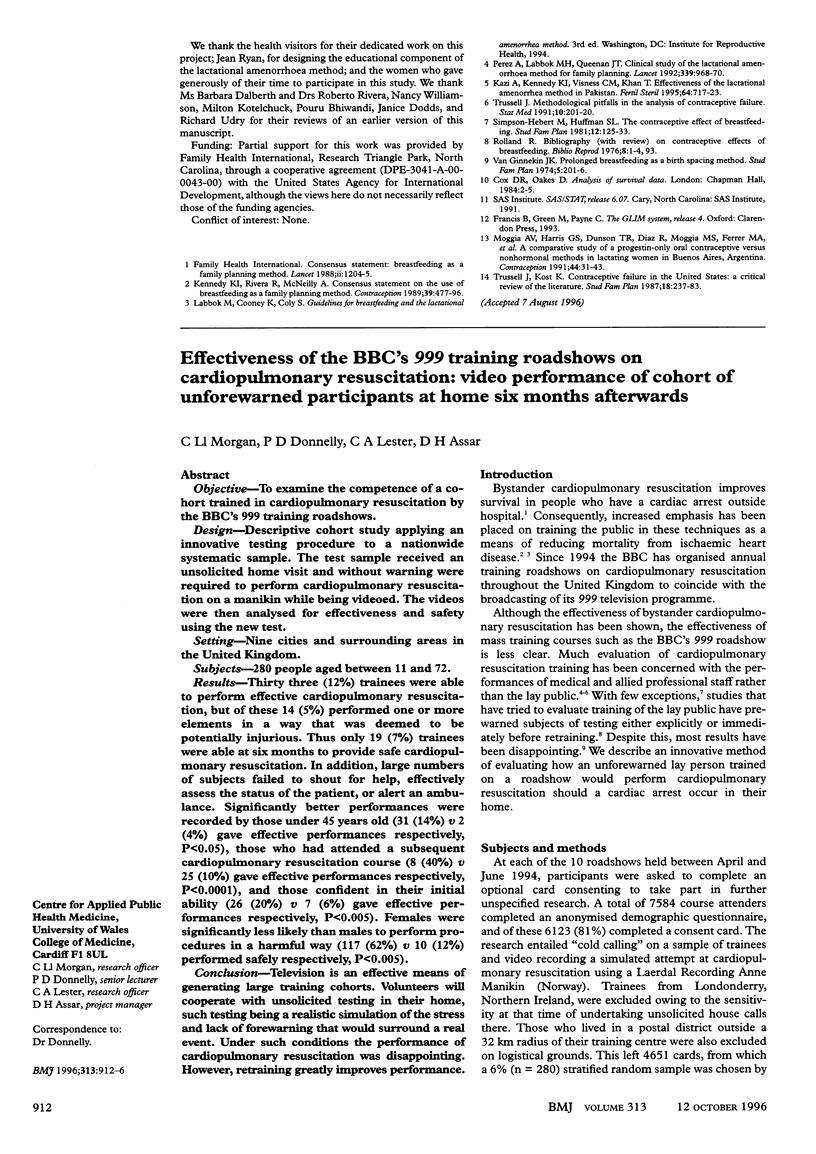
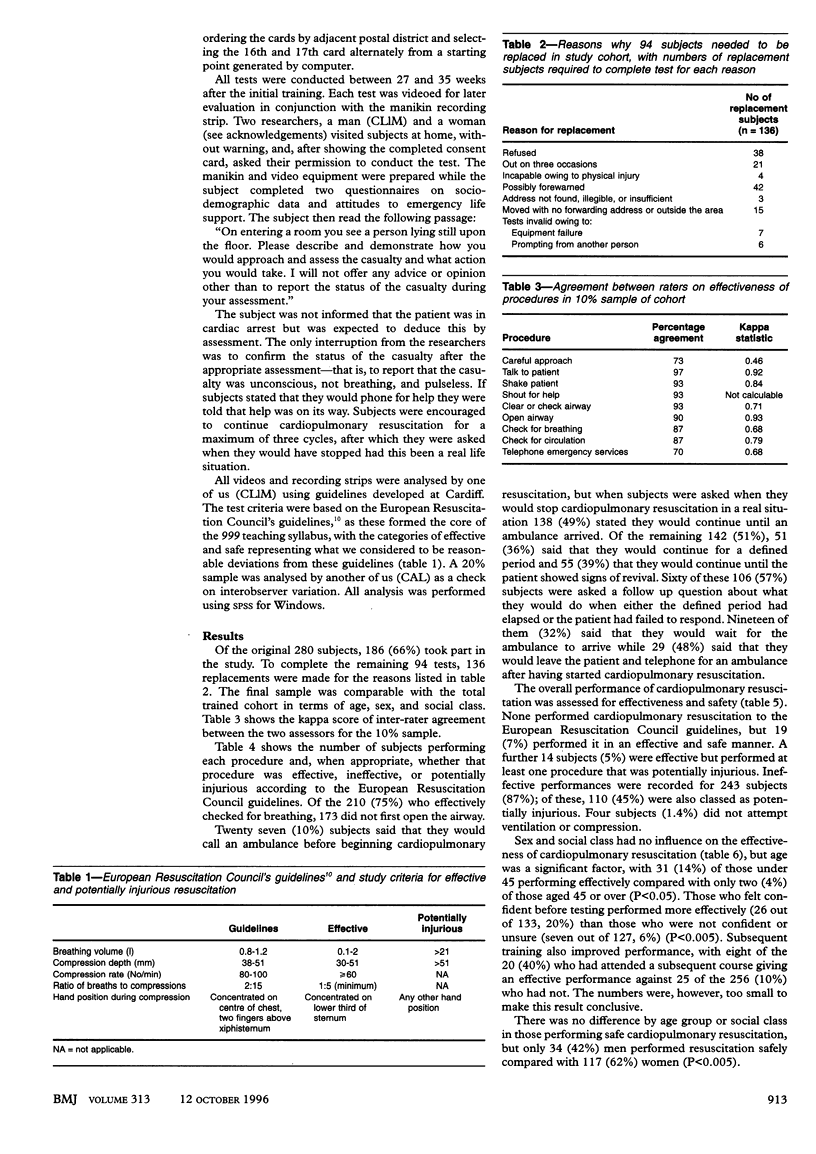
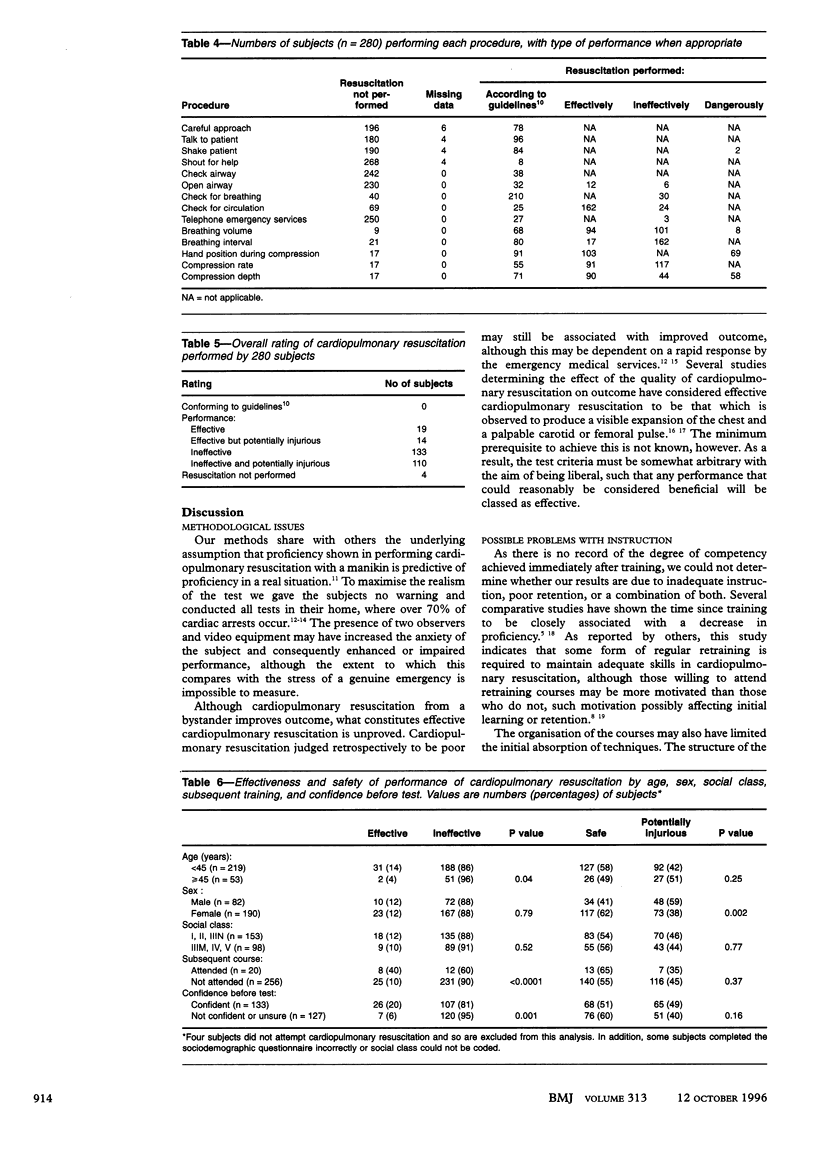
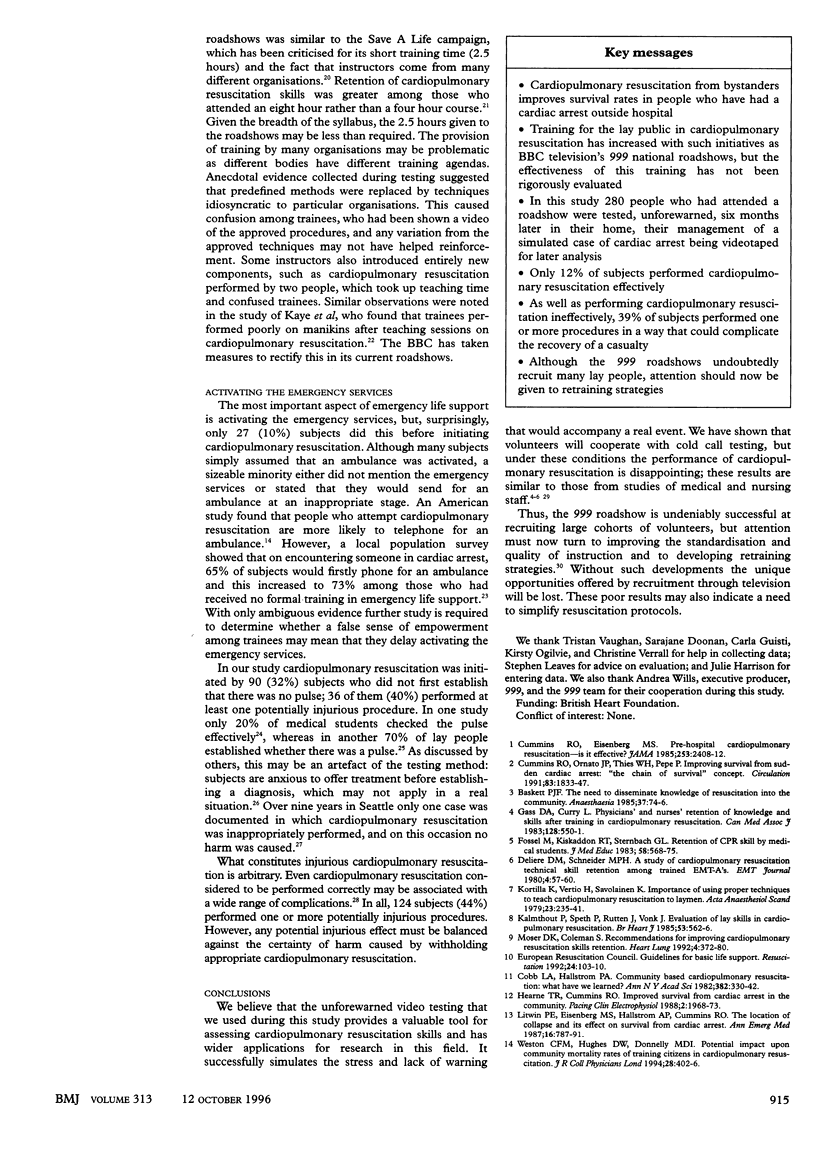
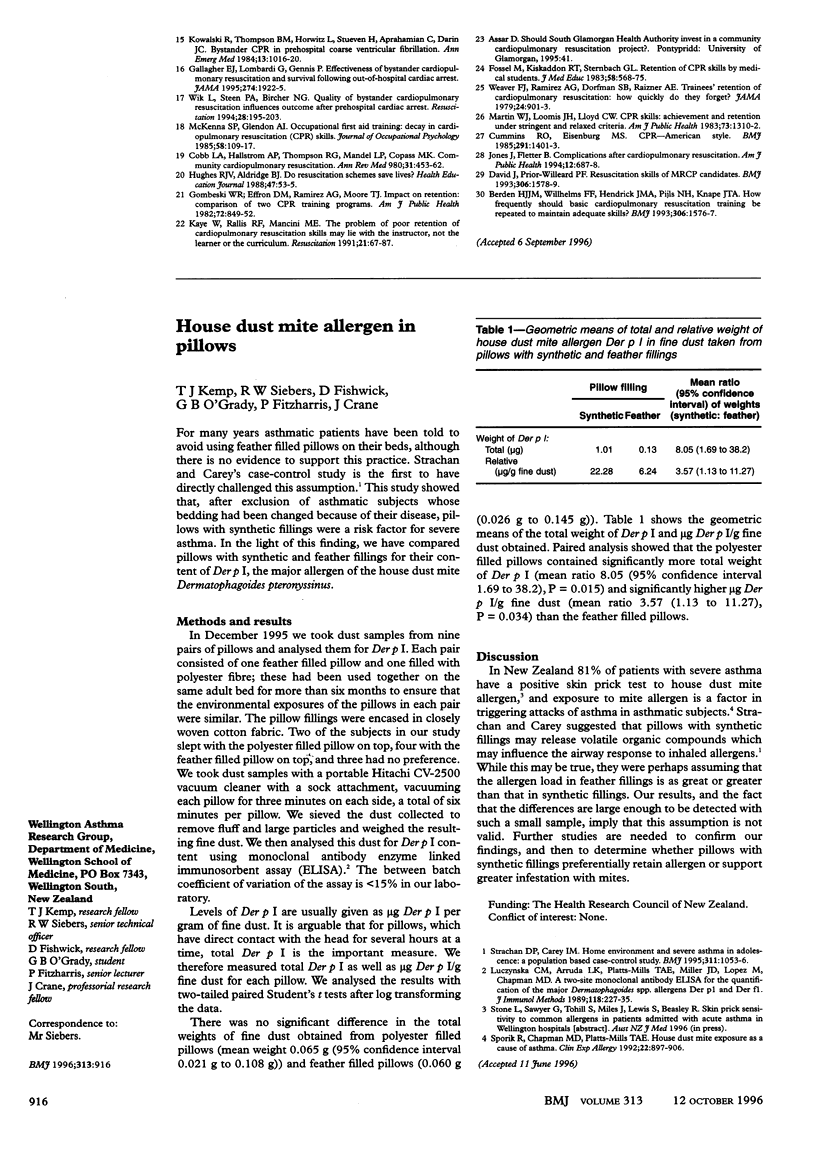
Selected References
These references are in PubMed. This may not be the complete list of references from this article.
- Berden H. J., Willems F. F., Hendrick J. M., Pijls N. H., Knape J. T. How frequently should basic cardiopulmonary resuscitation training be repeated to maintain adequate skills? BMJ. 1993 Jun 12;306(6892):1576–1577. doi: 10.1136/bmj.306.6892.1576. [DOI] [PMC free article] [PubMed] [Google Scholar]
- Cobb L. A., Hallstrom A. P. Community-based cardiopulmonary resuscitation: what have we learned? Ann N Y Acad Sci. 1982;382:330–342. doi: 10.1111/j.1749-6632.1982.tb55228.x. [DOI] [PubMed] [Google Scholar]
- Cobb L. A., Hallstrom A. P., Thompson R. G., Mandel L. P., Copass M. K. Community cardiopulmonary resuscitation. Annu Rev Med. 1980;31:453–462. doi: 10.1146/annurev.me.31.020180.002321. [DOI] [PubMed] [Google Scholar]
- Cummins R. O., Eisenberg M. S. Cardiopulmonary resuscitation--American style. Br Med J (Clin Res Ed) 1985 Nov 16;291(6506):1401–1403. doi: 10.1136/bmj.291.6506.1401. [DOI] [PMC free article] [PubMed] [Google Scholar]
- Cummins R. O., Eisenberg M. S. Prehospital cardiopulmonary resuscitation. Is it effective? JAMA. 1985 Apr 26;253(16):2408–2412. [PubMed] [Google Scholar]
- Deliere H. M., Schneider L. E. A study of cardiopulmonary resuscitation technical skill retention among trained EMT-A's. EMT J. 1980 Jun;4(2):57–60. [PubMed] [Google Scholar]
- Fossel M., Kiskaddon R. T., Sternbach G. L. Retention of cardiopulmonary resuscitation skills by medical students. J Med Educ. 1983 Jul;58(7):568–575. doi: 10.1097/00001888-198307000-00007. [DOI] [PubMed] [Google Scholar]
- Fossel M., Kiskaddon R. T., Sternbach G. L. Retention of cardiopulmonary resuscitation skills by medical students. J Med Educ. 1983 Jul;58(7):568–575. doi: 10.1097/00001888-198307000-00007. [DOI] [PubMed] [Google Scholar]
- Gallagher E. J., Lombardi G., Gennis P. Effectiveness of bystander cardiopulmonary resuscitation and survival following out-of-hospital cardiac arrest. JAMA. 1995 Dec 27;274(24):1922–1925. [PubMed] [Google Scholar]
- Gass D. A., Curry L. Physicians' and nurses' retention of knowledge and skill after training in cardiopulmonary resuscitation. Can Med Assoc J. 1983 Mar 1;128(5):550–551. [PMC free article] [PubMed] [Google Scholar]
- Gombeski W. R., Jr, Effron D. M., Ramirez A. G., Moore T. J. Impact on retention: comparison of two CPR training programs. Am J Public Health. 1982 Aug;72(8):849–852. doi: 10.2105/ajph.72.8.849. [DOI] [PMC free article] [PubMed] [Google Scholar]
- Hearne T. R., Cummins R. O. Improved survival from cardiac arrest in the community. Pacing Clin Electrophysiol. 1988 Nov;11(11 Pt 2):1968–1973. doi: 10.1111/j.1540-8159.1988.tb06336.x. [DOI] [PubMed] [Google Scholar]
- Jones J., Fletter B. Complications after cardiopulmonary resuscitation. Am J Emerg Med. 1994 Nov;12(6):687–688. doi: 10.1016/0735-6757(94)90042-6. [DOI] [PubMed] [Google Scholar]
- Kaye W., Rallis S. F., Mancini M. E., Linhares K. C., Angell M. L., Donovan D. S., Zajano N. C., Finger J. A. The problem of poor retention of cardiopulmonary resuscitation skills may lie with the instructor, not the learner or the curriculum. Resuscitation. 1991 Feb;21(1):67–87. doi: 10.1016/0300-9572(91)90080-i. [DOI] [PubMed] [Google Scholar]
- Korttila K., Vertio H., Savolainen K. Importance of using proper techniques to teach cardiopulmonary resuscitation to laymen. Acta Anaesthesiol Scand. 1979 Jun;23(3):235–241. doi: 10.1111/j.1399-6576.1979.tb01445.x. [DOI] [PubMed] [Google Scholar]
- Kowalski R., Thompson B. M., Horwitz L., Stueven H., Aprahamian C., Darin J. C. Bystander CPR in prehospital coarse ventricular fibrillation. Ann Emerg Med. 1984 Nov;13(11):1016–1020. doi: 10.1016/s0196-0644(84)80061-x. [DOI] [PubMed] [Google Scholar]
- Martin W. J., Loomis J. H., Jr, Lloyd C. W. CPR skills: achievement and retention under stringent and relaxed criteria. Am J Public Health. 1983 Nov;73(11):1310–1312. doi: 10.2105/ajph.73.11.1310. [DOI] [PMC free article] [PubMed] [Google Scholar]
- Moser D. K., Coleman S. Recommendations for improving cardiopulmonary resuscitation skills retention. Heart Lung. 1992 Jul-Aug;21(4):372–380. [PubMed] [Google Scholar]
- Weaver F. J., Ramirez A. G., Dorfman S. B., Raizner A. E. Trainees' retention of cardiopulmonary resuscitation. How quickly they forget. JAMA. 1979 Mar 2;241(9):901–903. [PubMed] [Google Scholar]
- Wik L., Steen P. A., Bircher N. G. Quality of bystander cardiopulmonary resuscitation influences outcome after prehospital cardiac arrest. Resuscitation. 1994 Dec;28(3):195–203. doi: 10.1016/0300-9572(94)90064-7. [DOI] [PubMed] [Google Scholar]
- van Kalmthout P. M., Speth P. A., Rutten J. R., Vonk J. T. Evaluation of lay skills in cardiopulmonary resuscitation. Br Heart J. 1985 May;53(5):562–566. doi: 10.1136/hrt.53.5.562. [DOI] [PMC free article] [PubMed] [Google Scholar]


